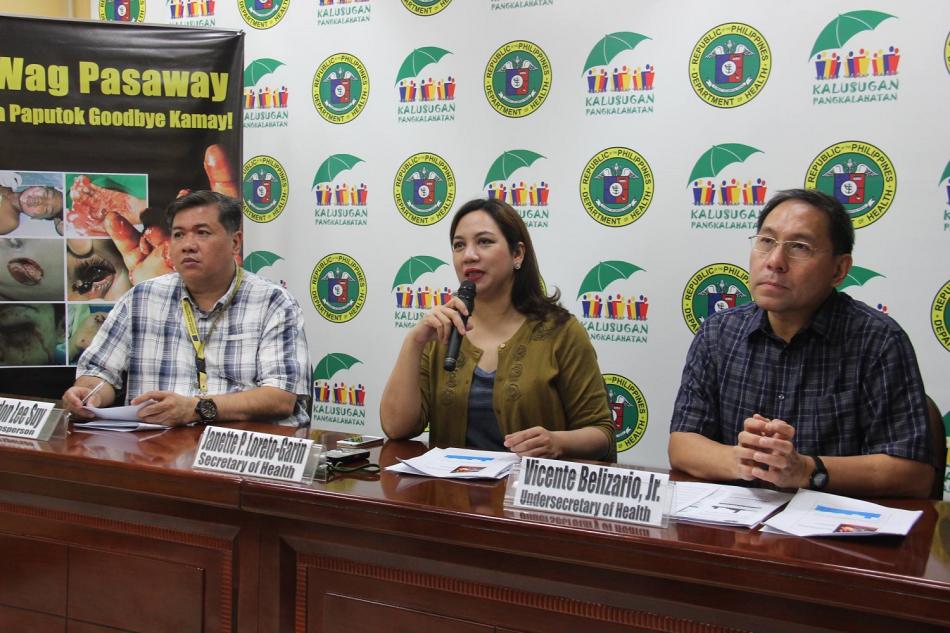Breaking
DOH turns down random testing of Zika virus infection

(Photo from the Department of Health’s website)
MANILA – The Department of Health (DOH) turned down Monday call for the conduct of random testing or even voluntary testing for Zika virus amid the country’s first mosquito-borne illness case recorded since 2012.
With this, Health Secretary Janette Garin said that allowing such testing would create panic among the people, adding that it was not among the recommendations of the World Health Organization (WHO).
Garin said random testing in the barangay level will possibly lead to assumption that DOH was a “testing kits” agents.
“Ayaw naman natin mapagkamalan tayo nag-aahente ng testing kit ng zika virus. We will do what is recommended, we will do what is good for our people. We will not create panic,” Garin said.
Garin added, “We don’t want to patronize or promote voluntary Zika testing because it will just be a waste of money.
What could happen is if we create panic, people will be forced to shell out money that is unnecessary.”
The DOH chief said that they also did not want people, who have no symptoms of the disease, flocking to hospitals and medical facilities to get tested for possible infection of the virus.
“If you test people that are without symptoms, you cannot get anything. You can only test for the virus once there is active infection. Not all of those afflicted with the virus develop symptoms. About 75 to 80 percent would not manifest symptoms,” she explained.
Garin said that testing kits use should be maximize and that testing people without symptoms would be useless because the virus could not be traced.
She further said that if DOH would allow random testing, that can cause the people to be “scared” which will in turn drive them to waste resources or unwise spending of money.
She also said that the problem was that it could lead to dilute of the thinking for the things that matters most.
The call for zika virus testing in the barangay level was made after the DOH confirmed Sunday afternoon that an American, who visited in the country and stayed from Jan. 2 to 28 or almost four weeks, was detected with zika virus infection by the United States Centers for Disease and Control (CDC) which then notified the DOH.
Because of that DOH had began tracing the places that the American patient visited and had conducted the testing to those who had displayed the active symptoms.
The suggestion was made in the facebook post of cardiologist, Dr. Willie Ong.
“I am urging DOH to FINALLY start testing 200 or more people for ZIKA virus in the barangays. I believe you will get many Zika positive cases. If one American visiting Luzon could get Zika, then many other Filipinos already have Zika virus. Let us stop CLOSING our eyes to this virus that may harm our babies and people. We are already 2 months LATE in testing our people for ZIKA. Let us not wait any longer,” Ong said in the post.
“Zika virus infection is not deadly. However, ‘Yong epekto nya doon sa dinadalang bata yun ang nagkaroon ng importansya because there is a huge possibility that there is direct relationship between mycrocephaly, Guillain–Barré syndrome (GBS) and zika virus,” she added.
She also clarified that DOH never claimed that the country was zika-free because it even said that the presence of Aedes Aegypti mosquito that transmit zika virus is also present in the country.
The said mosquito was also the same type that transmit dengue, chikungunya, Japanese encephalitis.
She said that the fight would be more effective through participation in the maintenance of cleanliness in the environment to discourage breeding sites of mosquitoes.
The recent confirmed case involving an American was the second confirmed case of zika virus infection in the country.
The first one was in 2012 wherein a 15-year male was tested positive for zika virus infection.
The patient then from Cebu has no travel history to countries where zika-virus infections were recorded.
At the same time, Garin urged the public to focus on how to prevent being afflicted with the virus by ensuring that their surroundings are clean and free from potential mosquito-breeding sites.
“Our main target is really for vector control,” she said.
At present, the department has a total of 2,000 testing kits for Zika virus with additional supplies already having been ordered from the Centers for Disease Control and Prevention





















